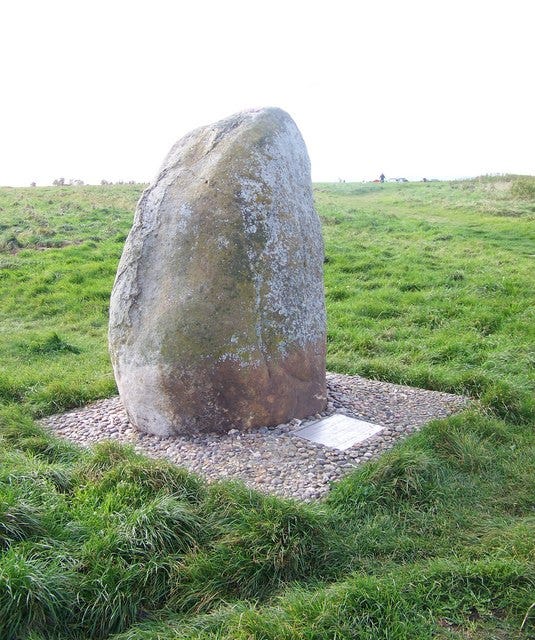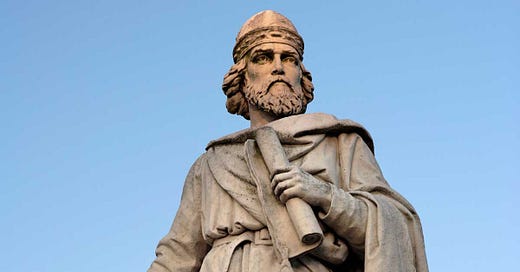The Life Of Alfred The Great As Told By the Anglo Saxon Chronicles Part Two
What do the Chronicles say about the conflict between the English, the Vikings, and Alfred’s role in the war?
In 871, Alfred is recorded leading a ‘great army’ with his brother to Reading to fight against the invading Vikings. A ‘great slaughter’ occurred, and after the battle, the ‘Danish had possession of the place of slaughter.’1 We are not given enough information to form critical opinions of campaigns or judge tactics employed by either side. The quote above refers to a bloody battle in which Alfred and his brother suffered defeat, or failed to prosecute a victory over their enemy. Readers are deprived of a full account of the conflict and the major decisions taken by the participants.
Four days after the battle at Reading, Alfred fights alongside his brother. Viking raiding armies are ‘put to flight’; thousands are killed. The Danes achieved a victory over them fourteen days later.2
The close-fought nature of the struggle is highlighted in annals for two months after. Aethelred and Alfred fight against a raiding army of two bands. They put both bands to flight, ‘and for long in the day had the victory’ again amid ‘great slaughter.’ However, the Danish had ‘possession of the place of slaughter.’3
After Aethelred’s death, Alfred acceded to the throne of Wessex. More warfare with the Vikings in 871 is recounted in the Chronicles:
King Alfred with a small troop at Wilton fought against the whole raiding army, and for a long time in the day put them to flight, and the Danish had possession of the place of slaughter. And that year there were 9 national fights (folc gefeoht) fought against the raiding army in the kingdom south of the Thames, besides those forays which Alfred, the king’s brother, and a single ealdormen and king’s thegns often rode on, which were never counted. And that year were killed 9 jarls and one king; and that year the West Saxons made peace with the raiding army.4
In his first battle as king, Alfred fights alongside a small troop against a whole raiding army. The Chronicles tell us Alfred is facing a challenge of immense difficulty from the very outset of his reign. The Vikings are put to flight, but the frequent refrain denoting Danish victory or at least immovability is noted again. The Vikings had possession of the place of slaughter.
The word ‘folc gefeoht’ (national fight) is used to describe conflicts between the Vikings and West Saxon people.5 The use of this term intimates that Alfred stood ahead of a united force. This unity is tied to the accession of Alfred.
The references to uncounted forays that Alfred himself engaged in, betrays the existence of another primary source on which the Chronicles drew. It also suggests that these forays were known by someone, perhaps inside or close to Alfred’s retinue, who relayed this information to the scribe, having previously neglected to make a detailed account of it. The scribe chronicling Alfred’s fledgling kingship felt it necessary to point to additional combat involving Alfred besides that which he was in the process of recollecting. In this record, an emphasis is placed on Alfred as a man of action capable of engaging in many battles and coming out of these battles with his capacity to carry on fighting intact.
The killing of nine jarls, who were Norse or Danish chiefs, and one king, points to some success being enjoyed by the West Saxons. This occurs just before they make peace with the Vikings. The absence of the details of this agreement may point to unflattering terms imposed on Alfred’s men. An earlier entry for 865 shows Kentish inhabitants paying money to the Vikings in return for peace. An absence of such an act being recorded by the West Saxons, particularly following Alfred’s first battles as king, is understandable given the dynastic focus of the Chronicles.6 The specific numerical notice of prominent slain Danes that precedes details of the peace, may attest to the scribe’s decision to practice an economy with the truth.
The absence of an explanation for Viking possession of battlefields immediately after they are put to flight is suggestive of a dictation to produce at least a slightly sanitised work. The likelihood that information was omitted is consistent with views ascribing the Chronicles to Alfred’s court. Little reason would have existed for a distant and disinterested observer to obfuscate the details of the West Saxon defeat.

In 878, the Chronicles record that in ‘mid-winter’ Wessex was ‘over-rode and occupied.’ In trying circumstances, Alfred leads a small troop ‘through woods into swamp fastness.’7
And that same winter a brother of Ivar and Halfdan was in Wessex in Devonshire with 23 ships, and he was killed there, and 800 men with him and 40 men of his war band. And the Easter after, King Alfred with a small troop built a fortification at Athelney, and from that fortification, with that part of Somerset nearest to it, was making war against the raiding army. Then in the seventh week after Easter he rode to Egbert’s Stone to the east of Selwood, and there came to join him all Somerset and Wiltshire and that part of Hampshire which was on this side of the sea- and were glad of him. And one day later he went from those camps to Island Wood, and one day later to Edington, and there fought against the whole raiding army, and put it to flight, and rode after it as far as the fortification, and stayed there 14 days; and then the raiding army granted him prime hostages and great oaths that they would leave his kingdom, and also promised him that their king would receive baptism; and they fulfilled it thus. And 3 weeks later the king Guthrum came to him, one of thirty of the most honourable men who were in the raiding army, at Aller- and that is near Athelney- and there the king received him at baptism; and his chrism-loosing was at Wedmore; and he was 12 days with the king, and he greatly honoured him and his companions with riches.8
Notably, the reference atop the above passage to more than 800 Vikings dying is recorded in a laconic fashion. Had Alfred had a hand in this victory, one would expect the scribe to have emphasised this triumph, given the very strong focus on Alfred in the previous passages.
Alfred’s physical resourcefulness in building a fortification, fighting a raiding army, and then riding to Egbert’s Stone, where Somerset, Wiltshire, and Hampshire gladly unite under him, is elaborated. The act of Alfred building a fortification is mentioned as though he did this unaided, rather than it merely being undertaken at his behest. The scribe’s recording of his actions assigns vitality to Alfred through the brisk description of events. Alfred’s gumption in responding to Viking onslaughts is apparent. He is noted making movements on consecutive days before arriving at Edington and putting a whole raiding army to flight. He then pursues the enemy on horseback.
In 886, Alfred occupied London ‘and all the English race' (Angelcyn) turned to him'.9 In this example, Alfred is again presented as a source of unity not just for the West Saxons but for the English as an ethnic group. This last entry indicates Alfred’s battling prowess served as a harbinger of a fledgling English unity.
In keeping with the Christian teleology of the history in which the Alfredian translation programme and the Chronicles served to root Alfred’s kindred, the taking of London follows an entry for the year 885 where Pope Marinus sent Alfred ‘great gifts and part of the Cross on which Christ suffered.’9 It is suggested that the relic of part of the Cross conferred the power of the divine on Christian efforts to repel the Vikings.
In 900, Alfred’s death is recorded very briefly. He is described as having been ‘king over all the English race except that part which was under Danish control.’10 The last entry of the Chronicles for Alfred’s life made the point of underlining Alfred’s status as king of all the English people, except those under occupation. This supports claims that the fostering of English unity was a key motive for the production of the works. The identity of those under Alfred’s jurisdiction is deemed to be more important than the geographical breadth over which he held sway. The Chronicles unequivocally point to Alfred as the catalyst of English national unity.
Source
Michael Swanton, The Anglo-Saxon Chronicles, London, 2000,
Michael Swanton, The Anglo Saxon Chronicles, London, 2000, 70
Ibid 70
Ibid 70-72
Ibid 72
Ibid 72
Ibid 68
Ibid 74
Ibid 74-76
Ibid 80
Ibid 91




